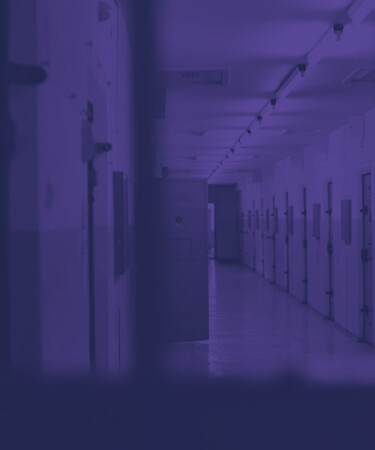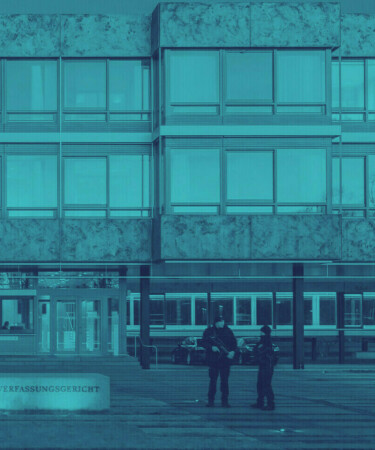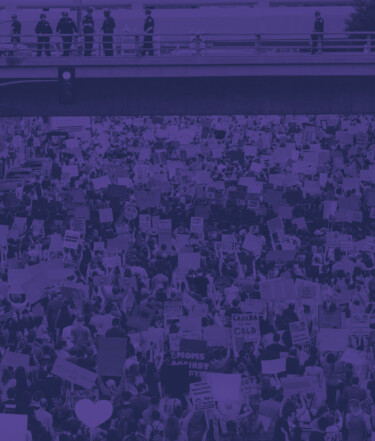
Restricted access to phone calls for prisoners is unconstitutional
A statement by the GFF concludes that the Bavarian restrictions on prison phone calls violate the right to rehabilitation and the protection of the family.
When, how and under which circumstances may prisoners in German prisons make phone calls? What is the significance of phone calls to rehabilitation and social reintegration? These and other questions are addressed in a statement submitted by the GFF to the Federal Constitutional Court. The statements shows that phone calls are often the only way which allows prisoners to stay in touch with family and and friends who live at a greater distance. Phone calls are also - e.g. for children - less stressful and time-consuming than visits. In addition to visitation rights, phone calls therefore play an important role in maintaining contact with the outside world. As studies repeatedly confirm, it is precisely these contacts that are crucial for rehabilitation.
"If we as a society take rehabilitation seriously, we need to adjust the conditions of imprisonment in German prisons to life on the outside - also and especially with regard to the means of communication available," says Jürgen Bering, author of the statement and lawyer at the GFF. "For effective rehabilitation, a right to phone calls is indispensable - however, currently only the state of Bremen grants this right. It would be appropriate for modern times to also grant prisoners access to the internet, video calls and messenger services. Bavaria, on the other hand, is still opposing technology from the 19th century."
Inmates' communication from prisons does not cause any significant problems. This is shown by the comparison made in the statement with other federal states and countries that have largely allowed phone call and, in some cases, internet access for years. These regulations were expanded during the Corona pandemic - without negative consequences - to compensate for limited visitation rights.
Latecomer Bavaria: Implementation of prisoner phone calls in Germany
With the exception of Bavaria, the penitentiary laws of all German states allow correctional institutions (JVAs) to grant phone calls to prisoners even in non-urgent cases. By law, these calls may only be subjected to surveillance in case of a concrete danger. In practice, communication is only very rarely monitored, primarily in the context of pre-trial detention.
In practical terms, prisoners' ability to make phone calls varies. In some cases, telephones are available to inmates in a commonly accessible location, such as the corridor. Prisoners are also allowed to make phone calls - mostly under supervision - in the office of prison staff. These two types of phone calls usually do not enable private conversations. In the case of prison cell telephony, on the other hand, prisoners are given their own telephone in their prison cell. Mobile phones are generally not permitted. Calls from outside are generally not possible.
The right to rehabilitation is a fundamental right
According to the principle of alignment and the right to rehabilitation, life in prison ought to prepare inmates as well as possible for life in freedom. This premise is jeopardised, when life outside prison is increasingly determined by internet-based technology, while life in prison is purely analog.
Technological advancement in recent decades has not only led to widespread network coverage, but also to a steady decline in the cost of phone calls. Today, phone calls, along with the use of the internet, are an important part of leisure and professional life, available 24 hours a day, 365 days a year outside the penal system. In fact, a large part of communication in Germany is shifting to so-called messenger services or social networks. Although demanding a right of access to the internet would go beyond the specific questions addressed in the GFF's statement, this demonstrates that the Bavarian regulation restricting phone access is from a bygone era and endangers rehabilitation.
In addition to the right to rehabilitation, Article 6 (1) of the Basic Law also protects prisoner phone calls as a key element of maintaining relationships to prisoners' families, especially children. The children's own right to contact with their parents must also be taken into account.
Prisoner phone calls do not endanger prison security. On the one hand, there are no specific indications that more phone calls result in an increase in crime inside the prisons. On the other hand, the prisons have extensive measures at their disposal to minimise potential dangers. In particular, "whitelists" or "blacklists" can be used to allow or block certain phone numbers as well as the option to restrict access to phone calls via disciplinary measures.
Restriction of prison phone calls leads to discrimination against certain groups of prisoners
Family and friends of prisoners who live abroad or far away from the prison can only rarely or not at all visit prisoners. Especially in the case of prisoners whose main place of residence is abroad or whose family and friends live abroad, contact to them is only possible via long-distance communication.
Due to work-related commitments, not all family members and friends of prisoners will be able visit them during the often very restrictive time slots for prison visits. In addition, it can be difficult to afford the cost of the visit to the prison. This concerns both the costs for the outward and return journey as well as the costs for overnight stays and often also the loss of wages for the time of the visit in the case of precariously employed persons.
In all other federal states and European countries examined in the statement, the regulations on prisoner phone calls are more liberal than in Bavaria. Some allow prisoners to use other means of long-distance communication in addition to phone calls. The number and duration of permitted phone calls vary greatly depending on the state, the type of prison (closed, semi-closed or open) and the legal status (pre-trial or correctional detention). As a result, however, all states surveyed grant their prisoners a legal right to phone calls.
Problematic lack of privacy during phone calls
In addition to the specific situation in Bavaria, the statement also sheds light on other problems of prison phone calls. In particular, a legal right to phone calls is essential for effective rehabilitation. However, only Bremen grants such a right.
Moreover, the circumstances under which phone calls are granted can have a counterproductive effect. For example, many prisons allow phone calls in communal spaces so that other prisoners can listen in. This creates significant barriers for prisoners to have intimate conversations or to discuss mattters with their lawyers. The study shows the following specific practical problems:
- lack of privacy during phone calls,
- strengthening of hierarchical group structures,
- negative impact on access to legal protection,
- limited possibilities to respond to events outside the prison,
- Burdens especially for children due to visits to the prison, and
- unequal treatment of prisoners.
The GFF hopes that the Federal Constitutional Court will use the opportunity of the pending constitutional complaints to make statements on these issues as well. Our special thanks go to the many people from the prison sector who have provided us with in-depth insights.




